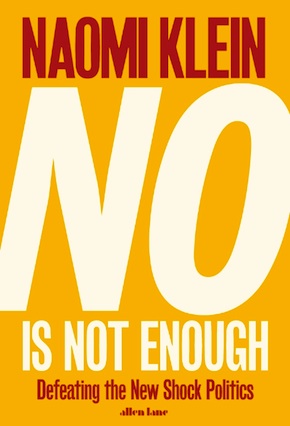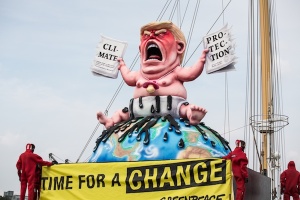After shock
by Mark Reynolds
“An ordinary person’s guide to hope. Read this book.” Arundhati Roy
On 4 July, a little under six months into Donald Trump’s presidency, I joined a packed audience of over 2,000 at the Southbank Centre’s Royal Festival Hall for an engaging and impressive keynote speech by Naomi Klein based around her latest book No Is Not Enough: Defeating the New Shock Politics. Klein equates Trump’s election and subsequent appointment of right-wing billionaire cronies and family members in key roles in his administration to a corporate takeover of government designed to generate wave after wave of crises that will pave the way for radical policies that can only harm democracy, the environment, the economy, national security and international relations.
Klein wrote the book unprecedentedly fast, in the months following Trump’s alarming election win. She was driven by a need for “intellectual disaster preparedness”, anticipating the most destructive policies likely to be rolled out under a Trump administration so they can be countered as they arise, and to put Trump squarely in the context of neoliberalism, “the economic project that made his presidency possible”.
Quoting from the book, she declares, “Cornel West said: ‘Justice is what love looks like in public’. I often think that neoliberalism is what lovelessness looks like in public. It looks like generations of children, overwhelmingly black and brown, raised amidst a landscape of lack of care. It looks like the rat-infested schools of Detroit. It looks like water pipes leaking lead and poisoning young minds in Flint, Michigan. It looks like foreclosed mortgages on homes that were built to collapse. It looks like famished hospitals that feel more like jails, and overstuffed jails that are humanity’s best approximation of hell. It looks like trashing the beauty of the planet as if it had no value at all. It is, much like Trump himself, greed and carelessness incarnate.”
Exactly week after the book was published, the horrific fire at Grenfell Tower in north Kensington joined that litany of disaster and shame. “Every decision that contributed to that epic crime,” says Klein, “was grounded in a brutal calculus that systematically discounted the lives of poor people, overwhelmingly people of colour. The decision to save money on flammable cladding, the decision not to install sprinklers, not to fix alarm systems or fire doors, or the decision to cut the number of firefighters. To do all of this in a city absolutely coursing with private wealth, this is lovelessness in public.”
This panopticon state, all-seeing and all-knowing, cannot see the most glaring of human needs – for shelter, for safety, for healthcare, for clean water and clean air. Nor can it apparently perform the most basic tasks of care.”
London’s inadequate public housing is surrounded – and overlooked – by shiny new luxury apartment blocks that in large part serve as remote investments for “newly-minted oligarchs from Moscow to Colombia” to safeguard “untaxed income made from speculative finance”.
“It is worth noting that putting his name on shiny, half-empty towers like that is Donald Trump’s line of business. He entered the global, high-end real estate market at a time when an unprecedented amount of untaxed private wealth was sloshing around looking for safe places to park.”
Surface over substance is at the heart of “the crisis of values, of morality… of our time.” We are monitored in all aspects of our daily lives: from emails, text messages and social media to online and in-store shopping and street cameras. “Yet this panopticon state, all-seeing and all-knowing, cannot see the most glaring of human needs – for shelter, for safety, for healthcare, for clean water and clean air. Nor can it apparently perform the most basic tasks of care.”
But cracks in the neoliberal veneer are beginning to show – from the Women’s Marches and associated protests timed for Trump’s first day in office, and resistance by Congress to the Trump administration’s extreme and chaotic executive orders, to rising public anger and growing support for meaningful democratic socialism around the world.
“Clearly it is the culture itself that must be confronted now,” Klein insists, “and not policy by policy, but at the root. And this is what we are starting to see with insurgent left candidacies and parties like Bernie Sanders in the United States, Podemos in Spain, Jean-Luc Mélenchon in France and Jeremy Corbyn and the Labour Party here in the UK.
“The spell of neoliberalism has been broken, crushed under the weight of lived experience and a mountain of data. What for decades was unsayable is now being said out loud by candidates who win millions of votes – free college tuition, double the minimum wage, 100% renewable energy as quickly as technology allows, demilitarise the police, prisons are no place for young people, refugees are welcome here, war makes us all less safe – and the crowds are roaring their agreement.”
These campaigns are “the first tremors of a profound ideological realignment from which a progressive majority can and must emerge. For decades, elites have been using the power of shock to impose nightmares. Donald Trump thinks he’ll be able to do it again and again. But crises do not always cause societies to regress and give up. There is also, always, that second option, that faced with a grave common threat we can choose to come together and make an evolutionary leap. We can surprise the hell out of ourselves by being united, focused and determined.
“And if we ever need a reminder of what the stakes are,” she concludes, “think about Grenfell Tower, a mass gravesite where people were incinerated in their homes for the sake of a few pounds., because we live in a world where profits matter more than lives. Let’s call this what it is: it’s savagery. And it’s the kind of shock that can and should change the world. It’s time to find our fury, my friends, and our faith too. Faith that we can do more than just say no to the cruelties of this crumbling system, faith in our capacity to build the safe and caring world that is the dream we have been suppressing for far too long. Faith, at last, to say yes.”
Listen to Naomi Klein’s speech in full, including an introduction, conversation and Q&A with the Southbank Centre’s artistic director Jude Kelly.
 Naomi Klein is an award-winning journalist, syndicated columnist and author of the international bestsellers No Logo (2000), The Shock Doctrine: The Rise of Disaster Capitalism (2007) and This Changes Everything: Capitalism vs The Climate (2014). She is a member of the board of directors for climate-action group 350.org and Senior Correspondent for The Intercept. A Puffin Foundation Writing Fellow at The Nation Institute and contributor to The Nation magazine, her recent articles have also appeared in The New York Times, The New Yorker, The Boston Globe, the Guardian, the London Review of Books and Le Monde. She has multiple honorary degrees and in November 2016 was awarded the Sydney Peace Prize. No Is Not Enough: Defeating the New Shock Politics is out now from Allen Lane/Penguin in paperback, eBook and audio download.
Naomi Klein is an award-winning journalist, syndicated columnist and author of the international bestsellers No Logo (2000), The Shock Doctrine: The Rise of Disaster Capitalism (2007) and This Changes Everything: Capitalism vs The Climate (2014). She is a member of the board of directors for climate-action group 350.org and Senior Correspondent for The Intercept. A Puffin Foundation Writing Fellow at The Nation Institute and contributor to The Nation magazine, her recent articles have also appeared in The New York Times, The New Yorker, The Boston Globe, the Guardian, the London Review of Books and Le Monde. She has multiple honorary degrees and in November 2016 was awarded the Sydney Peace Prize. No Is Not Enough: Defeating the New Shock Politics is out now from Allen Lane/Penguin in paperback, eBook and audio download.
Read more
noisnotenough.org
@NaomiAKlein
Author portrait © Kourosh Keshiri
Mark Reynolds is a freelance editor and writer, and a founding editor of Bookanista.
@bookanista


